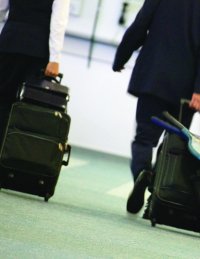 The ban on all liquids in carry-ons in August was just another weary reminder to business travelers of the post-9/11 world in which they operate.
The ban on all liquids in carry-ons in August was just another weary reminder to business travelers of the post-9/11 world in which they operate.

The ban on all liquids in carry-ons in August was just another weary reminder to business travelers of the post-9/11 world in which they operate. The ban came after the British foiled a plot in London to use liquid explosives to blow up passenger planes headed to the United States. While travelers quickly adjusted to the new rules — at Portland International Airport it was virtually a non-event — it was a reminder that random security crackdowns are still part of traveling.
|
The long waits in line following that incident also renewed debate over plans to offer a Registered Traveler (RT) program that would offer express screening for passengers willing to undergo extensive government background checks and submit to eye and fingerprint scans. Registered Travelers are subject to the same carry-on restrictions and must pass through the same screening as other passengers, but they get to use an expedited security line. The fee is around $100 a year.
The Transportation Security Administration (TSA) says 12 airports are interested in the program, but would not release the names. Orlando International is the test airport and has had RT since July (with 26,000 members). The program’s rollout was to expected to start this summer, but the TSA now says there is no firm timeline for implementation. Travelers will sign up either with the aiport or the air carrier, whichever entity has signed an RT agreement.
Portland International Airport is not participating in the RT program because “we already have express lanes in place that essentially address the goals of the RT program,” says airport spokesman Steve Johnson. “With the express lanes covered, we feel it’s prudent to evaluate the actual tests of the program before making any final decisions.”
An express lane is available at the checkpoints for passengers enrolled in qualifying airline mileage programs, or passengers traveling between Portland and Seattle. For more information, go to /.docs/pg/451?redirect_id=20105/Travel_Checkpoints.aspx
Some of the largest airports are also opting out of the program, including those in Atlanta, Detroit, San Francisco, and Boston’s Logan Airport. Opponents such as the American Civil Liberties Union see the program as an unnecessary invasion of privacy. The Air Transport Association, the primary trade association for U.S. air carriers, has asked airports across the country not to participate in this program because it says it would be a waste of resources.
Advocates for the program say frequent fliers need to get through airports more quickly.
“This would be great for business travelers,” says Caleb Tiller, of the National Business Travel Association, which is based in Washington, D.C. He says he expects the RT program to roll out later this year.
The TSA says it expects 10-20 more airports in the next phase of the program. It plans to take public comment for one year, then modify the program so it can be offered nationwide.
Even though it doesn’t offer the RT program, Portland’s aiport has made improvements to make traveling a little better. Johnson notes upgrades to the food and retail areas, the addition of a concourse connector, installation of Wi-Fi and upgraded conference facilities. In addition, a new parking system will debut in this spring to make finding a spot in the parking garage easier. Message signs on each level of the garage will note the number of vacant spaces and guide drivers to those available spaces.
— Robin Doussard
Have an opinion? E-mail [email protected]


